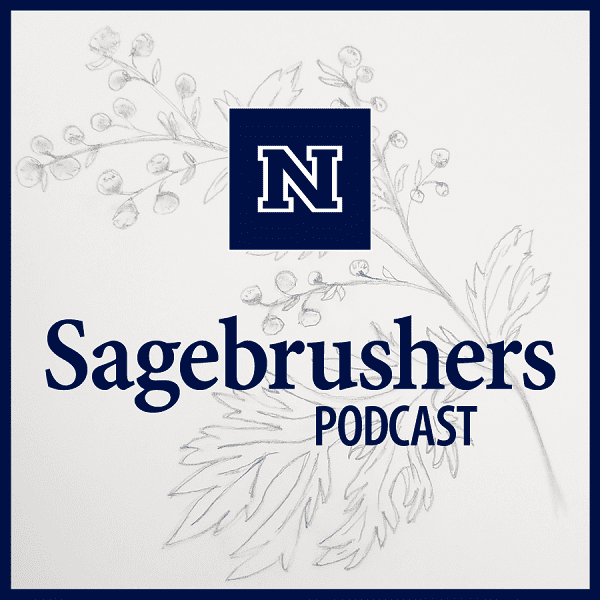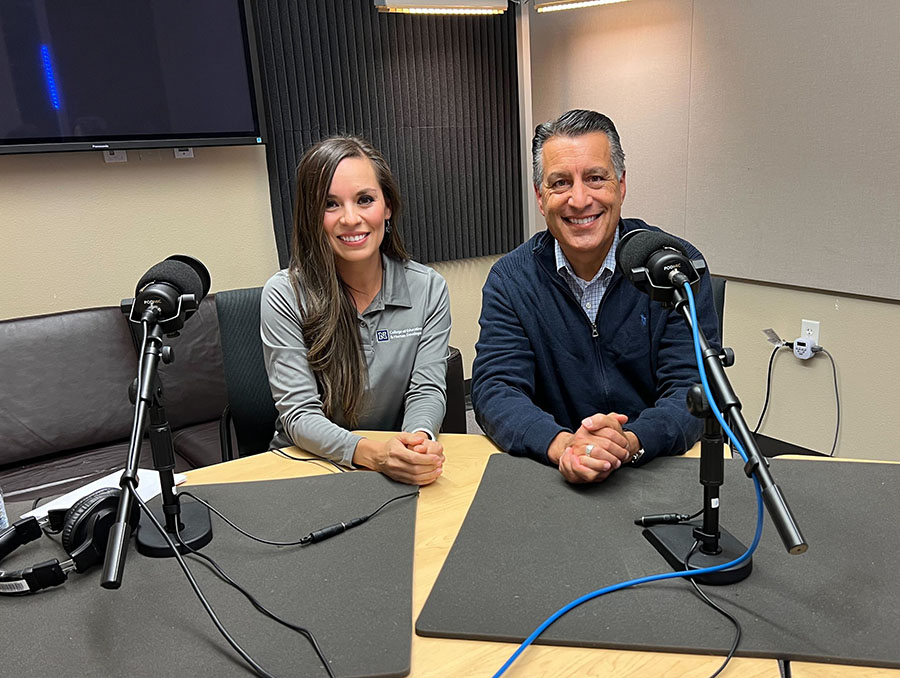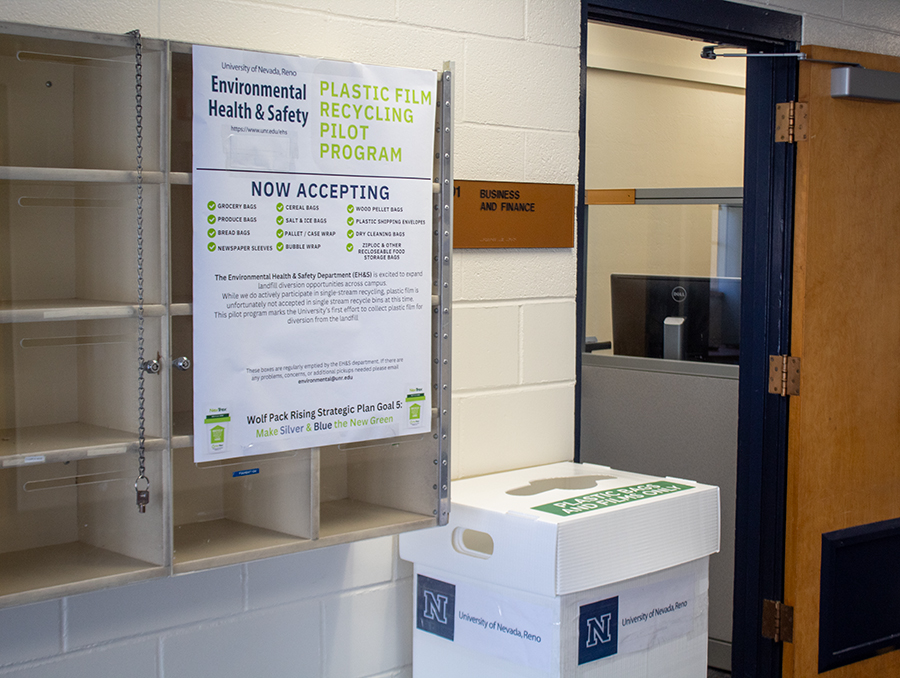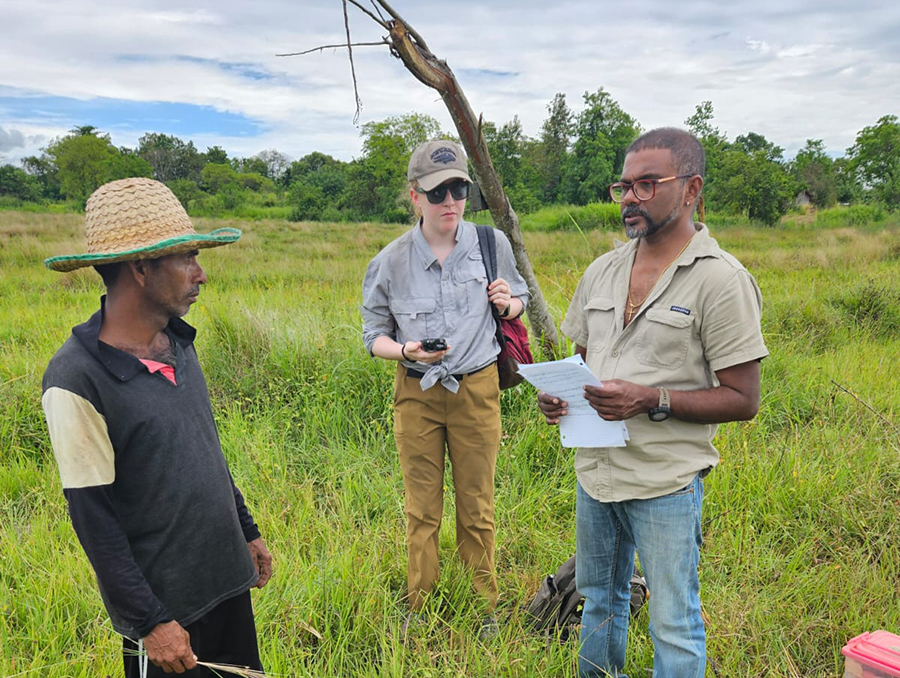
President Brian Sandoval hosts Director of the Latino Research Center and Associate Professor Jafeth Sanchez in this seventh episode of Sagebrushers. They chat about Sanchez's first nine months as director of the Center, the successes of the "El Grito" celebration and upcoming events, including "Tu Bienvenida" scheduled for Oct. 6. Sanchez also shares the Center's research goals as well as her experience a Washoe County math teacher prior to coming to the University. Sagebrushers is available on Spotify, Apple Podcasts and other major podcast platforms, with a new episode every month.
Sagebrushers – Ep. 7 – Dr. Jafeth Sanchez
Join host President Brian Sandoval as he and Director of the Latino Research Center and Associate Professor Jafeth Sanchez talk about the Center's recent and upcoming celebrations, its goals for the coming year, Sanchez's experience as a Washoe County math teacher and more.
President Brian Sandoval: Welcome to Sagebrushers, a podcast of the University of Nevada Reno. I'm Brian Sandoval. I'm a proud graduate and president of the University of Nevada, Reno and I'm your host of Sagebrushers. Each month, at Sagebrushers, which by the way was our University's first nickname, we take a closer look at the people, history and future of our University. We explain why the University, ever since its founding in Elko in 1874, has been about so much more than ourselves and why we remain Nevada's best experiment in understanding who we are and what we're capable of achieving. Today's podcast has been recorded at the Mathewson-IGT Knowledge Center on our University's campus.
In this episode of Sagebrushers, we welcome Dr. Jafeth Sanchez, the director of the Latino Research Center [LRC] and an associate professor of educational leadership at the University of Nevada, Reno. Dr. Sanchez is a three-time graduate of the University of Nevada, Reno, earning her bachelor's in secondary education and master’s and Ph.D. in educational leadership. She joined the faculty of the College of Education and Human Development in 2012 and in January to 2022, she became the director of the Latino Research Center in the College of Liberal Arts. As an associate professor, she has dedicated her career to developing high quality educational leaders. Her research focuses on educational leadership practices, organizational change efforts, gender and ethnic equity and student outcomes related to access, retention and completion - pretty amazing. It's wonderful. So, Dr. Sanchez, welcome to Sagebrushers. So excited that you're here and I want to start with this, by congratulating you on your new role as the director of the Latino Research Center [LRC], how have your first nine months been?
Dr. Jafeth Sanchez: Thank you, gracias. They have been so much fun; it's been super rewarding. I feel like I get to live out the mission of the University as a land grant institution and part of the LRC is to be the nexus between the University and the Latino community. So, it's super exciting. Then, in addition to that, I feel like I get to live out what I actually teach about and the work that I use as a researcher. So, it's, just an opportunity to be able to grow in the position but also grow the Center as well.
Sandoval: So, what's a highlight of your first nine months?
Sanchez: The biggest highlight is being able to interact with so many people in the community and in at the University, building those relationships or reconnecting with others and then just helping, you know, the one person who has one question about either how to become an entrepreneur, or how to be able to launch something else that they're aspiring to, and looking to the research center for. That is really exciting.
Sandoval: That's wonderful and so now that you've settled in, what vision do you have for the center?
Sanchez: My vision for the LRC is to have it serve as a pillar of Latino research, so that its findings, discoveries and innovations, that they all can lead to social cultural impacts in our community. So, having that cyclical process, where what we're identifying through the University processes can also impact what is occurring in our community.
Sandoval: So, you have, I'm sure a strategic plan in terms of what you want to accomplish in the next couple years. What are some of those top efforts that you're going to be focused on?
Sanchez: By far the largest one is building the research capacity for the Center. I think over time, it has tended to focus on events, which is great, but I'm really emphasizing even with events, how can that lead to research outcomes and products that can better inform what we're doing on our campus and then, how we're supporting the community in those ways. So, with a sense of belonging, with what faculty need to better their productivity as a researcher, with the way that we engage other partners in the community and beyond. So, lots of different pieces, but all tying back to the research focus, which is the name of the Center, Latino Research Center. And then the other part then, of course, is funding because so much of this is tied back to having those aspects tie back to excuse me tie back to the financial needs, whether it's to have graduate assistants who can do some of our work with us, so that we can provide services with data analyses, so that we can have reports for other organizations. So, all of that would be mostly the top priorities to be able to have the LRC be positioned to meet its potential, which I'm, you know, excited to be a part of.
Sandoval: Well, I think the sky's the limit - I'm really excited about this. So, what would be some of those questions that you need to answer through that research?
Sanchez: I have a few things in mind, but if I have focused on the priorities, you know, education continues to be a big piece in our state and really across the country. So, how can we better ensure that our educators are mirroring the demographics that we see in our community? And how can we do the same in higher education? So, really spanning that pique through higher education is important. Other aspects, in terms of topics related to the areas that the LRC could cover are immigration, we see a major need for public health, behavioral/mental health among the Latino community and then another big piece is just general policy on ways in which we can better support the Latino community, as that nexus with the University.
Sandoval: No and I'm a proud member of the Latinx community. And it's really important to me, one of my strategic goals and part of our strategic plan is to become a Hispanic Serving Institution and we are oh so close.
Sanchez: Yes.
Sandoval: So, for our listeners, you know, it requires a 25% enrollment to be able to be eligible to apply to be a Hispanic Serving Institution, and we're about 24%. So, what is it that the work of your office would do to help inform that?
Sanchez: Absolutely, I believe that it is directly related. So, with the research that the LRC can conduct, it can be tied back to how to retain faculty, how to help our faculty. If they identify as Latinx, they're also less likely to sort of venture into the world of applying for grants and seeking funding opportunity. So, I believe that LRC can be a partner for our own faculty and saying, ‘You know what, we can help you figure things out, you know, we can partner with you, we can be one of the individuals who either helps with your documentation, on submitting a proposal or including translation, or whatever it may be.’ We did this already in this last semester, even though I'm fairly new to the position, as you said, I reached out to just certain individuals on campus and said, ‘You know, what, I think this really fits your research interests. How about we apply?’ And some, they said, ‘Oh, my gosh, that's two weeks away. I don't think we can make it happen.’ But, but we did. And we had some of those grants awarded. And so, I believe we can help to support that generational opportunity within our own community.
Sandoval: That's fantastic and congratulations.
Sanchez: Thank you.
Sandoval: That’s really exciting for you and for our faculty and the institution. So, I'm going to move on to another question.
Sanchez: Sure.
Sandoval: On September 15, we kicked off Hispanic Latinx Heritage Month and to celebrate the LRC held an event a couple of weeks ago, really cool event. So, can you talk a little bit about that?
Sanchez: Yes. So, we plan to have Tu Bienvenida, which is a welcoming for Latinx students, Hispanic students, however they might identify. But unfortunately, the smoke got in the way of that one and we're actually rescheduling for October 6, I want to make sure that gets out there. It is a campus event for students and then we just held our El Grito of the University event. And that was intentional in that we wanted to create a sense of belonging with individuals that maybe might otherwise not feel that they belong on a university campus. So, we were in communication with the local low riders’ clubs in the area. And, it was such a successful event, we emphasized the opportunities for a sense of belonging, we had kids wearing you know, Nevada future students’ t-shirts, and they were able to just interact with other organizations on our campus. We had the mariachi Los Lobos de Plata band play for us, and it was just so much fun. I had families come back to me the next day saying, ‘Wow, this is the first time I've ever been on campus. We are entrepreneurs, we have children who we want to come to the University and thank you for opening the doors to us.’ So, it was just a way to highlight this particular culture, through the lorider piece. It's not to say that everybody can associate with lowriders or anything like that if they're of the Latinx-Hispanic demographic, but it is an important part of the history and we wanted to allow an opportunity to reclaim that and to highlight the arts in that process. Because I always say, even if we all are most, you know, aren't multilingual or don't have a connection, through part of that cultural piece, the arts can always connect us in some way. We always have an emotion that is brought about through that and that was a big piece of it through the cars, for example.
Sandoval: You use the word art, I mean, this is art and the individuals that were responsible for making a building and creating these lowriders. They're very unique and artistic. So, can you talk a little bit of the examples of some of those cars?
Sanchez: Yes, oh my gosh, they have just beautiful art that’s painted on there, the things that they use internally within the vehicle and outside with hydraulics and all these other things and they're expensive vehicles. So, you know, these are professionals that are really impacting our community, and we want to be able to highlight that part of the culture - are often it’s tied to Chicano culture and I co-planned this with Dr. Sandy Rodriguez who identifies as Chicana and so that's a way in which, you know, we were able to collaborate for this effort.
Sandoval: Now, and again, I really want to compliment you, because what an incredible event to bring our community in to make people better understand the cultural aspects of this. And I did get some informal feedback about how beneficial and how wonderful it was. And it just opens a whole new world to the campus. So, thank you for doing that.
Sanchez: Thanks. It was fun.
Sandoval: I wish I could have gone I was out of town. But in any event, do you have any other events that you have planned coming up?
Sanchez: We have our Día de Los Muertos event that is very Mexican focused - it's the origin of Día de Los Muertos, which is set for October 30. So, it's going to be later in the afternoon. It's in the Joe Crowley Ballroom. So, we're in the student union and then we'll have different entertainment from the community. So again, bridging that community with the University remains a paramount piece, and it's through a city of Reno arts and culture grant.
Sandoval: So, if I'm somebody who's not familiar with that event, what could I expect?
Sanchez: We see altars or ‘altares’ which are dedicated to those who have gone and it allows us to honor our families and then we see dance and the people's faces are covered. And they're very colorful, vibrant clothing that our individuals wear who attend and then there's dance, folkloric dance, there's music. The kids, they can do their own face painting that resembles Day of the Dead opportunities. If anybody's seen the movie, Coco, that's one of the, you know, highlighting pieces of what they can see at this event.
Sandoval: Sounds like a lot of fun. And it's a celebration.
Sanchez: Yes, absolutely.
Sandoval: Are there other ways that our University community and the greater Northern Nevada/greater Reno area can be involved with your Center?
Sanchez: Oh, there are so many ways. I have been engaging with so many organizations across the community, like joined together in Northern Nevada, you know, they're saying ‘we want to outreach to the community. We want to be of service to the community. Can you help us connect us to the Latino-Latinx individuals?’ And we're happy to do that. The Greater Nevada Credit Union, they are launching a major initiative on supporting the community in that way. And so, you know, we're collaborating to see how we can better help. Another one that comes to mind is that Nevada Mining Association. I was talking to their president recently, and in our conversation, I said, ‘I noticed you have a lot of educational materials, but none of them are in Spanish, what if we helped to put some of these in Spanish?’ and just continuing to be a part of the conversation is a huge piece. So, if anyone has any questions, I'm happy to see how we can help innovate what they're already doing, how we can just better support what they're already doing or how we can think about new ways to do new things.
Sandoval: That's extraordinary. Now, speaking of lowriders, I'm going to shift gears.
Sanchez: Sure.
Sandoval: But in any event, I want to hear about your story. Now, I've heard that you were a math teacher at Hug High School and won some awards for that.
Sanchez: Yes.
President Brian Sandoval:
So, let's talk a little bit about that and I also want to hear a little bit more about your journey to Nevada.
Sanchez: Thank you. I was born in Mexico, Mother de Chihuahua, Mexico. So, I always describe, if you think of the Sierra Nevada mountain range and you follow that down into Mexico, it becomes the Sierra Madre. So, I was born in a little town along that same mountain range and I grew up in Yerington, Nevada. So, I consider myself a small town, rural Nevadan girl. I've attended their entire K-12 educational system, and then I came to UNR and attended its entire higher education system. So, a lot of consistency there in terms of the educational pathway. I always wanted to be a teacher. I remember in first grade, staying after school, I used to live by the school, so I'd stay after school and help my teacher grade papers. I just loved being helpful. I loved being helpful to the students and to the teacher and in middle school, I knew I wanted to be a math teacher. I was the one who finished early and started helping everybody else and so, I just had a love for being able to problem solve, being able to you know, struggle in the process and then feeling so good about a solution and seeing how excited somebody else could be when I help them. So, I followed that trajectory, but my mom has this journal entry from my freshman year that she gave me when I got my first degree and it said, ‘I'm going to be a math teacher, then I'm going to go be a principal, and then I'm going to get my Ph.D.’ So, I was 15 years old, documenting and planning my whole future. It's just amazing to have been able to live it out, and I feel really blessed about that.
From the Hug [High School] side. I taught at Hug, I went to teach at Hug in 2010 because, even though I had my Ph.D., and I was being encouraged to be a professor and be in academia, I said, you know, ‘I always wanted to live out this possibility and I'm going to be a teacher.’ So, I had planned to be a teacher for at least 20 years before I entered higher ed. But, you know, the opportunity to be in higher ed eventually did come to me, and so, I came back to UNR. But it was so much fun being able to be with the students. I felt like I could see that daily impact in my work and influencing students and families and seeing that a future was possible for them too. So, seeing that potential and that growth was just so rewarding. I still sub., so when I can I sub, and it just keeps me connected to that level of education.
Sandoval: Well, your story is an inspirational one and what a role model for students. I just think it's phenomenal. So, we're about out of time. Is there anything else that you wanted the listeners to hear about the Center?
Sanchez: I just want everybody to know that you're all welcome. If I don't, you know, if I don't have an answer or I don't know how to approach a situation, I'm happy to connect you with the person who can. I really want to continue to serve the mission of the University, which is to be a land grant institution and that just ties directly with the mission of the LRC. It focuses on research, research collaborations, student achievement and an advocacy and outreach. So, all of those are integrated in something that we do and in some way that we all have similar aims.
Sandoval: So, if I'm visiting campus, where do I go to see you?
Sanchez: You will go to [Edmund J.] Cain Hall. So, if you're on the main floor of Cain Hall, you'll go downstairs and then you'll see signs to KUNR as well and so, we're right in that corner. If you're on Evans Street, we have a door that directly leads into our building.
Sandoval: That's right in the heart of campus, so it's a great location. So, unfortunately, that is all the time we have for this episode of Sagebrushers and thank you, thank you, thank you so much for joining us today, Dr. Sanchez. It really is a privilege and honor for me to get to speak with you and have you to be part of the Wolf Pack family.
Sanchez: The privilege is mine; thank you for having me.
Sandoval: Of course. So, next month, we will bring you another episode of Sagebrushers and continue to tell the stories that make our University special and unique. Until then, I'm University President Brian Sandoval, and go Pack!
Sanchez: Go Pack!















